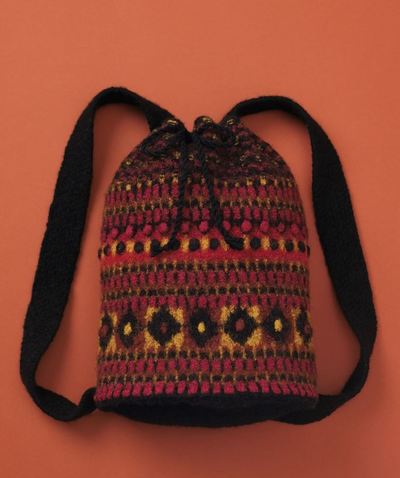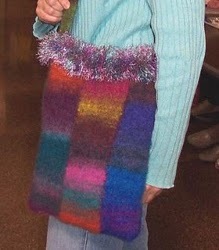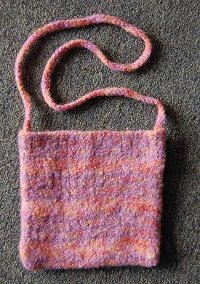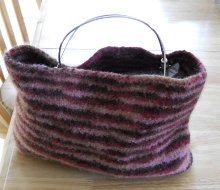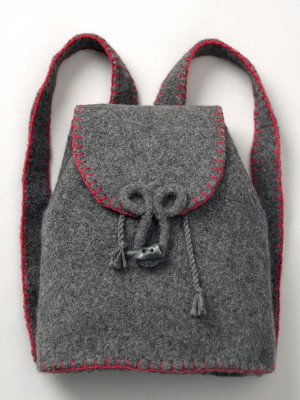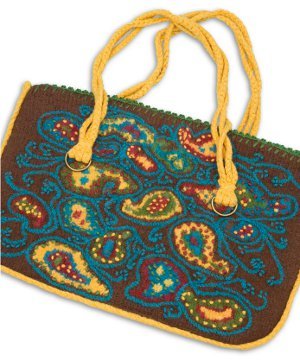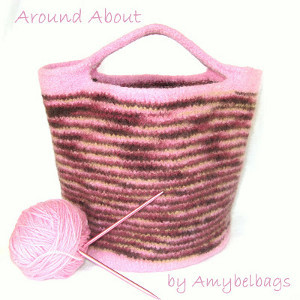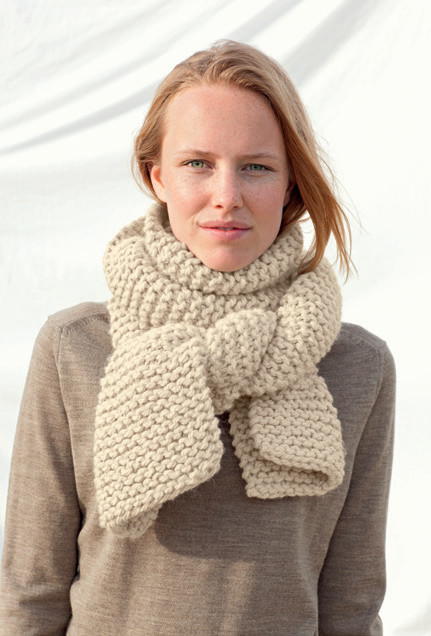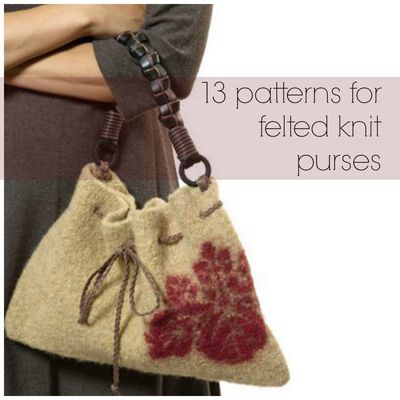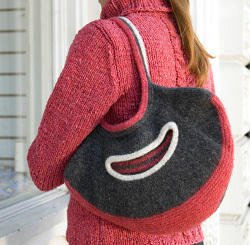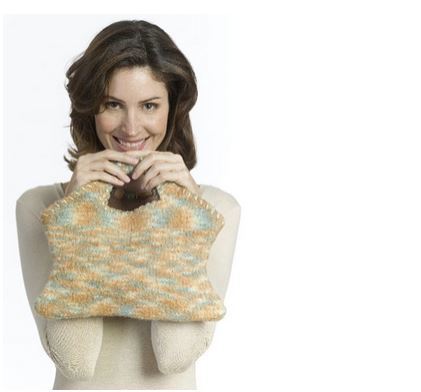Felted Tribal Knit Bag
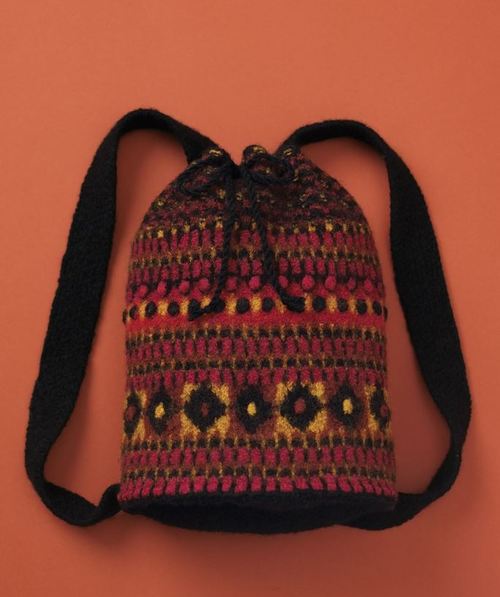
Tribal print fashion is all the rage nowadays. Whether you're high-tailing it to a music festival, or carrying your knitting supplies with you to the park, you'll do it in style with this Felted Tribal Knit Bag. The rich, deep colors give the bag a distinctly Aztec feel. Your friends probably won't believe that you knit this yourself. Not all free knitting patterns teach you how to felt and how to take care of your bag when it's done, but this includes both. Rest easy, you're taken care of. All you have to do is the knitting.

Knitting Needle Size7 or 4.5 mm, Circular Knitting Needles
Yarn Weight(4) Medium Weight/Worsted Weight and Aran (16-20 stitches to 4 inches)
Gauge1 stitches, 2 rows, 3 inches. stockinette stitch
Materials
- Patons® Classic Wool (100 g / 3.5 oz)
- Main Color (MC): (207 Rich Red) - 1 ball
- Contrast A: (226 Black) - 3 balls
- Contrast B: (204 Old Gold) - 1 ball
- Contrast C: (206 Russet) - 1 ball
- Size 4.5 mm (U.S. 7) knitting needles and size 4.5 mm (U.S. 7) circular knitting needle 16 ins [40 cm] long or size needed to obtain gauge.
Measurements: Approx 24 ins [64 cm] around x 11½ ins [29 cm] high
Stitch glossary:
Bobble = [(K1. yfwd) 3 times. K1] in next st. 7 sts. Slip 6th, 5th, 4th, 3rd, 2nd and 1st sts separately over 7th st. 1 st remains. Bobble complete.
Instructions
Note: When working from charts, carry yarn loosely across WS of work but never over more than 3 sts. When it must pass over more than 3 sts, weave it over and under color in use on next st or at center point of sts it passes over.
Main Section
With MC and circular needle, cast on 156 sts. Join in rnd, placing a marker on first st.
Knit rows 1 to 12 of Chart I, reading rows from right to left and noting 3 st rep will be
worked 52 times.
Rep rows 5 to 12 of Chart I once, dec 2 sts evenly across last rnd. 154 sts.
Knit rows 1 to 11 of Chart II, reading rows from right to left, noting 22 st rep will be worked 7 times and inc 2 sts evenly across last row. 156 sts.
Knit rows 1 to 12 of Chart I, noting 3 st rep will be worked 52 times.
Rep rows 5 to 12 of Chart I once.
With MC, knit 3 rnds. Knit rows 1 to 10 of Chart III, reading rows from right to left and noting 6 st rep will be worked 26 times
Knit rows 1 to 12 of Chart I, noting 3 st rep will be worked 52 times.
Ribbing: 1st rnd: *With B, K2. With A, K2. Rep from * around.
2nd rnd: *With B, P2. With A, K2. Rep from * around.
3rd rnd: *With A, P2. With C, K2. Rep from * around.
4th rnd: As 3rd rnd.
5th rnd: *With MC, P2. With A, K2. Rep from * around.
6th rnd: As 5th rnd.
7th and 8th rnds: As 3rd rnd.
9th and 10th rnds: As 2nd rnd.
Rnds 3 to 10 form ribbing pat.
Work a further 16 rnds in ribbing pat.
With A, knit 1 rnd. Cast off.
Base
With A and pair of needles, cast on 48 sts.
Proceed in stocking st until work from beg measures 15 ins [38 cm], ending with a purl row. Cast off.
Straps (make 2)
With A and pair of needles, cast on 9 sts.
1st row: (RS). *K1. P1. Rep from * to last st. K1.
Rep last row for seed st pat until Strap measures 27 ins [68.5 cm]. Cast off in pat.
FINISHING
Felt all pieces. Felted pieces for Main Section should measure approx 24 ins [64 cm] around and 11½ ins [29 cm] high.
Felted piece for Base should measure approx 8 ins [20.5 cm] wide and 11 ins [28 cm] high.
Cut Base to an oval shape 9 ins [23 cm] wide by 7½ ins [19 cm] high. Pin to bottom of Main Section. With 2 strands of A, blanket st Base to Main Section. Make small holes around top edge of Bag for drawstring 1¼ ins [3 cm] down from top edge, spaced approx 1 inch [2.5 cm] apart.
Trim Straps to measure 24 ins [61 cm] long.
Mark center st at top and base of Bag (center back). Sew ends of Straps on either side of marked st at top of Bag, under row of drawstring holes. Sew other ends of Straps 4 ins [10 cm] either side of marked st at base.
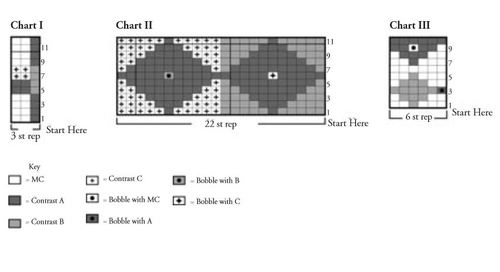
Drawstring: With 2 strands of MC, make a twisted cord 38 ins [96.5 cm] long. Weave through drawstring holes of Bag having cords meet at center front.
Twisted Cord: Cut 2 lengths of MC 95 ins [235 cm] long. With all strands tog hold one end and with someone holding other end, twist strands to the right until they begin to curl. Fold the 2 ends tog and tie in a knot so they will not unravel. The strands will now twist themselves tog. Adjust length if desired.
How to Felt Instructions
Important to know before felting:
- It is important to record all the measurements and changes before and after felting. You will be able to either adjust or repeat the method to produce reliable and consistent results.
- Always test a sample. Different colored yarns may felt differently. Some colors have to undergo the felting more than once in order to achieve the desired result.
- As yarn will be going into very hot water, color-fastness can be affected. Again, testing a sample will give you an indication of how the color will be affected in very hot water.
- Any knitting that has been properly felted will have a distinct texture. The knitted or crocheted piece becomes very dense and matted. This will be one of the key criteria for determining that felting has occurred.
FELTING
- Put pieces in top-loading washing machine. Put in a pair of jeans or large towel (in non-interfering color) for extra agitation. Using low water level, run a Hot/Cold cycle for 15 min.
- Add 2 tablespoons of baking soda for a small load. After one cycle, check for size. Repeat as necessary.
- Run through the rinse and dry spin cycle.
- Lay felted piece on a dry towel, away from direct heat or sunlight.
- Shape piece to correct measurements.
- Allow to dry thoroughly. Do not use a clothes dryer.
- If an edge ripples, baste a thread through the edge and gather in. Remove the thread after felted item is dry.
- When piece is dry, use tailor's chalk to mark cutting (trimming) lines.
AFTERCARE
- You have spent a lot of time and care completing these items through their knitting/crocheting and felting stages. A little thought to aftercare will ensure that you will have these beautiful felted items for many years to come.
- After you have subjected your item to the felting process, you may think that it has gone through the most vigorous and tortured wash that yarn could ever endure. Now you assume that you can throw that felted item into the hot wash cycle along with your sheets. Do not do it! Treat your newly felted item with caution and care in order to avoid further shrinkage or distortion.
- Felted handmade items can always be improved with brushing.
- Even a slight pressing will give a smoother appearance to felted fabric. Always press lightly using a steam iron and a damp cloth. Never press down on the fabric but hold the iron just above the fabric.
Knit swatch
After felting, the sample is approx 85% of the width and 75% of the length of the knitted sample before felting.
Read Next13 Patterns for Felted Knit Purses

